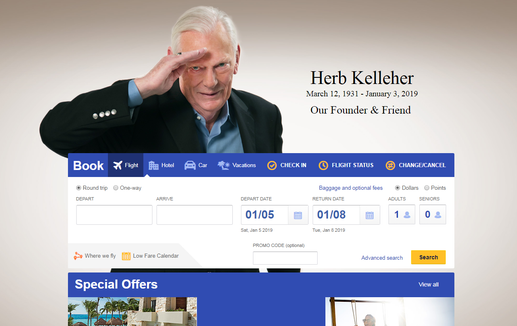Southwest Airlines' website paid tribute to co-founder Herb Kelleher on Friday, Jan. 4, 2018. (Photo: Southwest Airlines (screenshot))
The airline industry is mourning the loss of Herb Kelleher, Southwest Airlines co-founder who died Thursday (Jan. 3).
The larger-than-life bourbon-drinking Kelleher helped launch Southwest in 1971, creating the USA’s first big low-cost carrier and then shepherding it through the upheaval of airline deregulation and into the modern era.
Kelleher is universally regarded as a true visionary in American aviation, and his legacy in the industry that survives him is hard to overstate. Among the innovations that he’ll forever be associated with include:
Happy employees (and customers)
Contentious labor relations have been a hallmark of the modern airline industry, but that wasn’t true at Southwest under Kelleher. He famously believed that happy employees would lead to happy customers.
“Your employees come first,” goes one oft-quoted Kelleher line. “And if you treat your employees right, guess what? Your customers come back, and that makes your shareholders happy. Start with employees and the rest follows from that.”
Indeed, Southwest’s friendly and folksy employees were often cited by passengers as fast-growing Southwest enjoyed strong customer-service ratings from the 1980s into the 2000s.
AMFA National (@AMFANational) | Twitter
Low fares
Southwest debuted in an era where most big airlines were “full-service” carriers. But Southwest went a different direction under Kelleher.
Low fares became Southwest’s calling card.With this emphasis, Southwest eschewed first-class seating and maintained an egalitarian first-come, first-served seating policy that has persisted to today.
Critics have labeled that boarding process as a “cattle call,” but Southwest’s fares won it many converts over its first three decades.
TODAY IN THE SKY: Southwest Airlines reveals five new routes as it extends schedule into fall
Southwest was known for aggressively pricing its cheapest seats, especially when it entered new markets. That forced incumbent carriers to match Southwest’s fares, sometimes running out established “legacy” rivals who couldn’t turn a profit by matching Southwest’s fares.
It was a new phenomenon for the U.S. airline industry as it shifted from regulated era into the modern era that resulted from 1978’s Airline Deregulation Act.
When it entered new markets, Southwest’s presence was so pronounced that the U.S. Transportation Department coined the term the “Southwest Effect” in a 1993 report that looked at the effect expanding low-cost carriers were having on airfares.
TODAY IN THE SKY: Southwest says ‘Southwest Effect’ still going strong
Southwest, aided for many years by advantageous fuel-hedging contracts, continued to bill itself as the USA’s low-fare leader into the current decade. But today it faces leaner competitors in American, Delta and United, all of which have pared costs in bankruptcy filings since 1978. Today, those carriers typically match or even undercut Southwest’s fares.
But Southwest’s low-fare approach has spawned a new wave of “ultra low-cost carriers” (ULCCs). The airlines, which include U.S. carriers Spirit, Frontier and Spirit, are growing today using many of the tactics pioneered by Southwest.
No frills
Southwest’s open-seating concept never caught among at its U.S. competitors, but several of its other low-fare selling points have.
Southwest famously offered peanuts instead of full-service meals that were standard in decades past. Southwest’s insinuation was that customers booking its cheapest fares were essentially flying for peanuts – making the lack of meals worth the tradeoff.
When Southwest announced earlier this year that it would stop serving peanuts to help protect passengers who have severe peanut allergies, the move made national news since the carrier was nixing a snack that was been nearly synonymous with Southwest itself.
Even Southwest’s lack of first-class seating offered another no-frills template for modern low-cost carriers. A number of low-cost carriers have emulated Southwest’s coach-only approach, with European giant Ryanair among the most prominent.
IN PICTURES: 30 cool aviation photos (story continues below)
Source: Read Full Article
